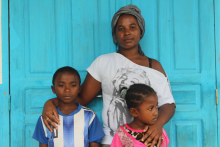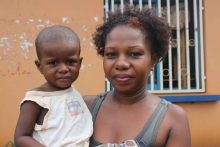In Madagascar, mothers show grit to protect their children as government, partners battle measles epidemic
Madera is not a trained health worker but she is waging her own personal “mother’s campaign” to encourage other women to vaccinate their children against measles in Madagascar.
“I think it is my duty to protect the health of my community. In addition, the current epidemic is different from the one we knew before – it is serious and deadly, and vaccination is the best way to prevent it. As they say, prevention is better than cure," Madera says proudly.
When President Andry Rajoelina officially kicked off a three-part vaccination campaign in the northern Diana region of the country in February, Madera jumped at the opportunity to vaccinate her two younger children, aged 9 and 2, and as many others as she could help. “When I learned about this campaign, having heard about measles deaths in my Fokontany [village], I went to see other mothers to encourage them to vaccinate their children,” she says. More than 1 500 children were targeted in her district.
Madagascar had not reported a measles outbreak in the past 10 years. The current epidemic underscores the necessity of vigilance. The measles epidemic that was declared on 4 October 2018 has affected 105 of the country's 114 health districts. Nearly 117 075 cases and 1 205 deaths have been recorded to date. Of the reported cases, 77% were children younger than 14 years, and 79% of the deaths were among children in the same age range.
In the Diana region, the number of recorded measles cases reached above the national average, and many health care facilities were overwhelmed – all beds reserved for children with measles in the regional reference hospital were occupied.
The Ministry of Health, with support from the World Health Organization (WHO), GAVI, the vaccine alliance, the Measles and Rubella Initiative, UNICEF and the United States Agency for International Development and other partners initiated the three-part vaccination campaign to ultimately target all children – 7 million – in the country aged 6 months to 9 years.
Long trek for the protection
Madera is not alone in her fear of the current epidemic. More and more parents are demanding the protection of their children's health. Some are going to great lengths for the vaccinations.
Families who live in hard-to-reach areas typically walk for hours to reach the nearest health facility. Vola, 28, and a mother of two children aged 9 and 5, who lives in a remote corner of the DIANA region, walked with them and her younger siblings 30 kilometres, carrying her daughter on her back, to reach the measles vaccination point. It took them six hours in the rain. They left home the day before the vaccination day.
“I want to protect my children and family from measles so they don't die like other children,” says Vola. “Even if I have to walk 5 to 6 hours both ways, it's not a problem. The most important thing is to stay healthy.”
As well as the prevention work through vaccination, partners are also enhancing the management of cases. WHO continues providing support at all levels of the country in the ongoing response to the epidemic to ensure the proper treatment of measles patients, in addition to medicines and other needed supplies.
Back in her Fokontany, Madera continues to contribute to the fight to eradicate measles and looks at the mark on her children’s fingers as badges of honour – they are protected. She is committed to making sure other children are also.
OMS Madagascar
Email : raminosoav [at] who.int (raminosoav[at]who[dot]int)




